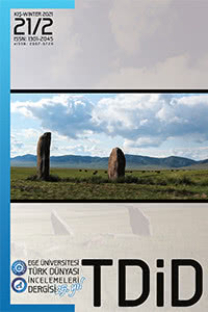Geleneğin Güncellenmesi Bağlamında “Duha Koca Oğlu Deli Dumrul” Hikâyesiyle “Deli Dumrul Kurtlar Kuşlar Âleminde” ve “Hop Dedik: Deli Dumrul” Adlı Sinema Filmlerinin Karşılaştırılması Üzerine Bir Deneme
Gelenek, kuşaktan kuşağa aktarılmak suretiyle toplumu meydana getiren bireyleri bir arada tutan kültürel değer, tavır ve davranışlardır. Geleneğin nispeten de olsa bir yaptırım gücü bulunmaktadır. Gelenek, geçmişten gelen değerlerin bir sonraki kuşağa aktarılması demek olduğundan bünyesinde bir sürekliliği de barındırır. Değişen sosyo-kültürel şartlara bağlı olarak bu “süreklilik” de varlığını devam ettirebilmek için kendini güncellemek durumundadır. Geleneğe ait unsurlar bu güncelleme noktasında orijinalinde var olan unsurları sunum bağlamında aslından çok da uzaklaşmadan çağa taşımak zorundadır. Bu makalede Türk sözlü geleneğinin en önemli eserlerinden biri olan Dede Korkut Kitabı’nın “Duha Koca Oğlu Deli Dumrul” adlı beşinci hikâyesi ile “Deli Dumrul Kurtlar Kuşlar Âleminde” ve “Hop Dedik: Deli Dumrul” adlı sinema filmleri; kişi kadrosu, zaman-mekân ve olayların işlenişi bakımlarından karşılaştırılmıştır. Giriş bölümünde söz konusu eser ve sinema filmleri arasındaki benzerlik ve farklılıklar tespit edilmiş, sonra geleneğin sinema filmlerinde ne ölçüde yaşatıldığı, değişim ve geleneğin güncellenmesi bağlamında ne kadar başarılı olunduğu tartışılmış ve sonuç bölümünde ise bu konudaki önerilere yer verilmiştir
Anahtar Kelimeler:
Gelenek, geçmiş, süreklilik, yenilik, güncelleme, Deli Dumrul
As a Part of Updating the Trandition, an Essay on the Comparison of the Story “Duha Kocaoğlu Deli Dumrul” and Motion Pictures “Deli Dumrul Kurtlar KuşlarÂleminde” and “Hop Dedik: Deli Dumrul"
Tradition refers to cultural values, attitudes, and behaviours that generates a society and holds people together by means of handing it from generation to generation. Tradition has the power of sanction to some extent. As it means transferring the values from the past to the next generation, tradition contains “continuity” in itself. Depending on socio- cultural conditions, this continuity has to update itself in order to continue its existence. At the point of this update, the elements belonging to tradition have to transfer the elements existing in its essence to the contemporary age without moving away from the original very much. In this assertion, “Duha Koca Oğlu Deli Dumrul” which is the fifth story of the Book of Dada Gorgud (Dede Korkut), one of the most important works of Turkish oral tradition, and two motion pictures which are “Deli Dumrul Kurtlar Kuşlar Âleminde” and “Hop Dedik: Deli Dumrul” are compared with regards to “dramatis personal casting”, time and place and course of events. In the introductory chapter, the similarities and differences between the aforementioned two works are detected. Then it is discussed to what extent the tradition is maintained in the motion pictures and how successfully variations and updating of tradition are fulfilled. In the conclusion part, some suggestions regarding this issue are stated
Keywords:
Tradition, history, continuity, modernity, updating, Deli Dumrul,
- ISSN: 1301-2045
- Başlangıç: 1996
- Yayıncı: Ege Üniversitesi Türk Dünyası Araştırmaları Enstitüsü
Sayıdaki Diğer Makaleler
Türklerde At Kurbanı ve Dede Korkut’taki İzleri
Yrd. Doç. Dr. Mustafa GÜLTEKİN
Heinrich Friedrich von Diez’in Tepegöz Tercümesinde Yaptığı Yanlışlar
Dede Korkut Kitabı’nda Baba, Oğul ve Baba-Oğul İlişkisi
İmge ve Göstergeler Uzamı: Dede Korkut Hikâyeleri
Uygulamalı Halk Bilimi Açısından Eğitim Sürecinde Dede Korkut
